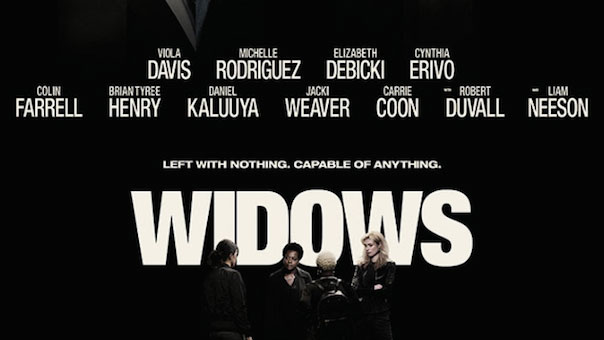Widows, based on the novel by Lynda La Plante, and previously adapted for a BBC television series, centres on the efforts of Veronica Rawlins (Viola Davis) to pull-off a heist left to her in the planning stages by her late husband, Harry (Liam Neeson). She recruits the other women whose husbands died in Harry’s unsuccessful job, played by Elizabeth Debicki and Michelle Rodriguez, who are later joined by Belle (Cynthia Erivo).There’s a deadline, too; Harry’s fatal heist involved the theft of money belonging to Jamal Manning (Brian Tyree Henry), a Chicago crime boss running for political office against the corrupt Jake Mulligan (Colin Farrell), and he wants his recompense.
This is Steve McQueen’s fourth feature film, and it’s becoming clear that he’s an inconsistent director of actors. The performances really run the gamut: he elicits exquisite work from Tyree Henry and Elizabeth Debicki in particular; some very middling material from Davis, Erivo, Rodriguez, and Duvall; and some plainly underwhelming fare from Farrell and Neeson.
The acting of Daniel Kaluuya in Widows is in its own category. He plays Jamal’s enforcer, and he is truly vicious. Kaluuya is two steps ahead of the material at every moment, as if he simply enters his scenes from another, much smarter, much nastier movie.
Kaluuya’s moments in the film are ruined by what hampers many of McQueen’s scenes, from across his work so far: his use of the camera. The exasperating ostentatiousness of McQueen’s master shot style is in evidence from the film’s first breath to its last; the self-consciously ‘smart’ framing, insubstantial long-takes, and for its-own-sake ambiguity does not serve the material well, and muddies the film’s discourse (already precarious in Gillian Flynn’s scattershot screenplay) considerably.
There is one example in the film of camera movement overcoming mere cleverness. After a rally is interrupted by a persistent journalist, Mulligan retires to his car, and begins ranting to his assistant. The camera is mounted on the hood, pointing left, showing one of the poorer neighbourhoods of Chicago’s 18th ward. The camera moves to the windscreen. Then it moves to the right; since the shot started, the car has travelled a short distance, but is now in an upmarket superb, where Mulligan resides. This shot expresses one of the movie’s points succinctly and with no small amount of flair.
But such intelligence is rare in Widows. For a movie in which grief and systemic racism wrestle for thematic supremacy, it’s marked by a glibness that isn’t easy to excuse. A strong stench of desperation rises from those scenes which reach for topicality; a moment at a gun-show is worthy of an eye-roll, as are the portions of the film set aside for the political machinations — but the lowest ebb is found in a crucial flashback to a sudden act of violence, the framing of which (emphasising a telling background detail) strips the image of its not inconsiderable power. As film art, as entertainment, and as an ideological object, Widows is garbled.
Director: Steve McQueen
Writers: Gillian Flynn (screenplay by), Steve McQueen (screenplay by)
Stars: Viola Davis, Michelle Rodriguez, Elizabeth Debicki
- How to Build a Girl (2019) - 10th March 2020
- Kontora (2019) - 4th March 2020
- True History of the Kelly Gang (2019) - 28th February 2020











